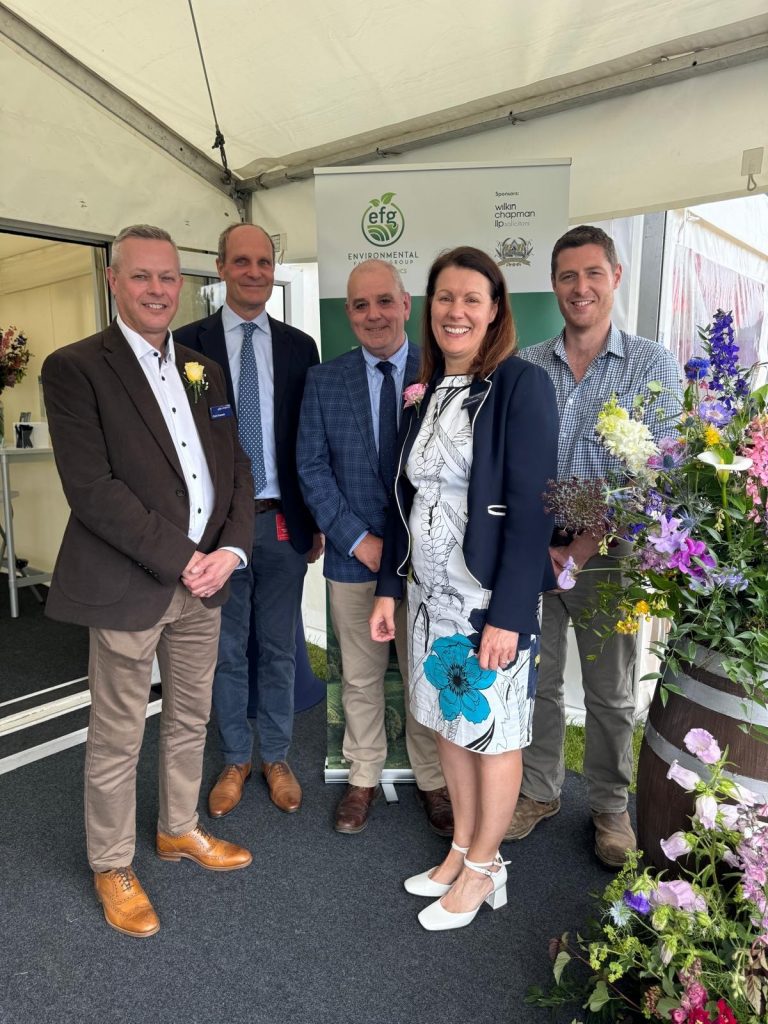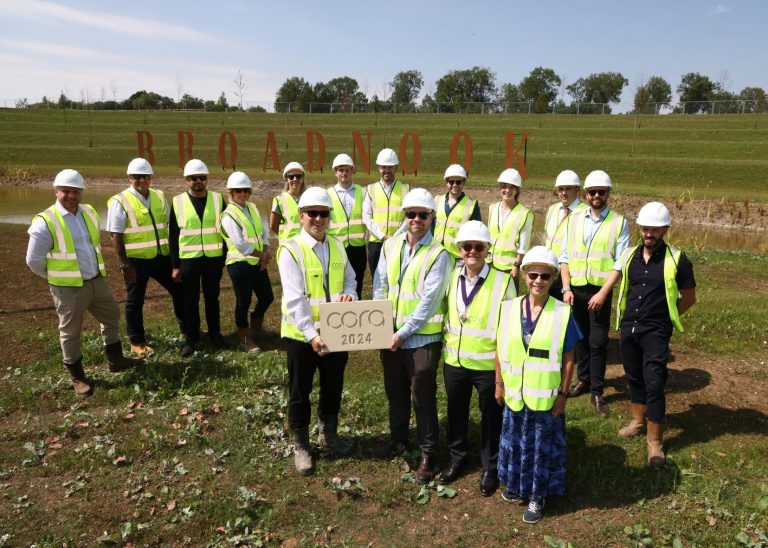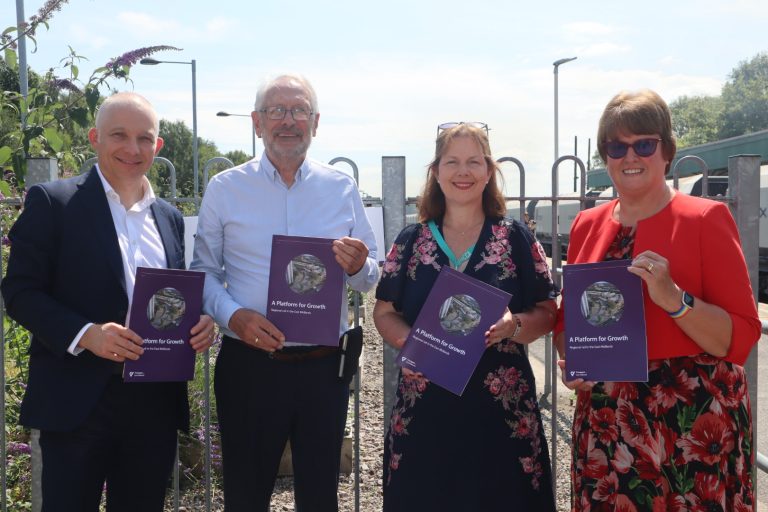Monday, October 13, 2025
Regional housebuilder Allison Homes has hired three new team members, to grow its marketing team and further develop the company’s brand.
Michael Hudson, Dan Bursnall and Connor Nottingham have been appointed as Group Marketing Manager, Regional Marketing Manager and Digital Marketing Executive respectively. The trio will all be based at Allison Homes’ head office in Peterborough, with Michael and Connor working on the company’s Group marketing and Dan covering its East region.
Michael has worked in marketing for more than a decade and in 2022 made the move to housebuilding, spending time at both Avant Homes and Miller Homes. Dan has been in the property sector for 13 years and began his career in sales, and Connor joins Allison Homes with five years of experience from working in digital marketing agencies.
Michael, now living in Chesterfield, said: “I joined Allison Homes as I wanted the opportunity to work for a trusted housebuilder at an exciting time of growth and development. I’m thrilled to be in a business that has a genuine culture of friendliness and offers support for its all employees.”
Dan, from Cambridgeshire, added: “I was looking to build my career with an organisation where I could make a difference. Being local, I knew a lot about what Allison Homes was doing in the area and was blown away by the quality of homes and passion of the staff. When this role came up, I applied immediately and was thrilled to secure the position.”
Connor, from Peterborough and now living in Deeping St James, Lincolnshire, said: “I wanted to join a company where I could fully commit myself, and work with a team that truly believes in its goals and cares about its customers. Having heard great things about Allison Homes, I knew I had to apply.”
Michael’s role as Group Marketing Manager includes making strategic brand decisions, analysing data and creating attention-grabbing campaigns.
Michael said: “There’s no such thing as a typical day and that’s why I love working in marketing. From HR and sales, to technical and commercial, getting to know people in different walks of life makes my job fun and varied, and helps me to create marketing materials and brand documents that are more effective.
“I’m looking forward to supporting Allison Homes through its exciting growth plans. As we grow into more sites and regions of the UK, I’m keen to ensure our brand stays consistent and that the incredible work we do achieves high levels of success.”
In his role as Regional Marketing Manager, Dan covers the marketing for upcoming and active developments and campaigns in the East region, as well as assists with the company’s Partnerships division.
Dan said: “The needs of the developments drive the priorities, so I could be working on a brochure for an exciting upcoming site, creating a new campaign to promote a particular home, or out on site looking at signage opportunities.
“Everyone at Allison Homes has been incredibly welcoming and supportive, and it is a genuine pleasure to be part of this outstanding team. Property marketing is my passion, and I am excited to establish myself at Allison Homes and make a meaningful contribution to the company’s success.”
A farmer-led cooperative has secured the funding needed to initiate trading opportunities for sustainably-minded farmers in North Lincolnshire, with the support of Lincolnshire and East Yorkshire’s largest law firm, Wilkin Chapman.
The firm joins agricultural machinery supplier Peacock & Binnington as the first sponsors of the Northern Lincolnshire Environmental Farmers Group (EFG), which aims to deliver positive environmental change, funded through natural capital trading.
The organisation aims to increase biodiversity in North Lincolnshire, improve water quality, achieve net carbon farming by 2040 and generate new trading opportunities for farmers.
The Northern Lincolnshire EFG is the 10th group of its kind to be established across the UK since 2020, with the EFG network now comprising 433 farmers, covering around 3% of England’s farmed area and a trading pipeline worth c. £10 million.
The Northern Lincolnshire group – which covers areas surrounding Grimsby, Scunthorpe, Immingham, Louth, Crowle and Epworth – has been set up by local farmers Andrew Jackson, from Pink Pig Farm, and William Sowerby, from Farming Forward. The group is now appealing for more members in the area.
Catherine Harris, head of the agriculture sector at Wilkin Chapman, said:
“When farmers work together, they can have a great deal of power. While there are groups that represent farming as a whole, the EFG is a rapidly growing voice for farmers who are particularly mindful of their sustainability, as well as their financial success.
“Farming plays a major role in the care of our ecosystem and I know environmental custodianship is very important to a great many farmers, so we hope that supporting the establishment and growth of this EFG will help farmers to work together to achieve this.”
The first Environmental Farmers Group was officially launched in May 2022, after a group of farmers came together in the Avon area to build on their local Farmer Clusters to strengthen their position to deliver environmental goods and services for fair reward.
It was convened by the Game & Wildlife Conservation Trust (GWCT), which founded the Farmer Cluster concept and whose scientific research is behind many of DEFRA’s ELM scheme agri-environment options. Against a backdrop of the transition away from the Basic Payment Scheme (BPS), the group grew in numbers and expertise, eventually forming a cooperative two years later.
The EFG acts as a trusted navigator for farmers and landowners in industries that focus on natural assets such as soil, air, water, plants and animals (known as the ‘natural capital sector’). Its goal is to use scale and member cooperation to secure the best environmental results and financial returns for a wide range of natural capital goods and services.
Members of the EFG get access to trading opportunities in natural capital markets, guidance on how to trade and benefit from farmer buying power in natural capital markets.
Bricks Group, development and management specialists in the student and co-living sectors, has secured £84.5m in funding from London Wall Lending to support the delivery of high-end Purpose-Built Student Accommodation (PBSA) on a former Royal Mail site in Nottingham.
The landmark new scheme will see the transformation of the former Bendigo Building site in the center of the city, which lay vacant for nearly two decades before its demolition in 2023. Once complete, the scheme will contain 752 beds over 13-storeys, with the potential to rise to 781 beds subject to planning permission.
The accommodation will be managed by Bricks’ in-house operating brand, true student, building on its brand portfolio of more than 7,000 beds across the UK. It will also provide a range of indoor amenities and landscaped gardens as well as commercial units on the ground floor for residents and the neighbouring community.
The 28-month loan facility will fund the two-stage transformation of the building by Graham Construction, with potential for a further £5.5m of funding to be unlocked if planning permission is achieved.
The deal represents the latest collaborative venture between the two firms, with London Wall having funded the development and disposal of Bricks’ Discovery Quays 1 and 2 schemes in Salford Quays, as well as providing a further £4m gross facility to assist with the purchase of a 355-bed PBSA plot in Leeds.
John Graham Construction has been selected to deliver Bricks’ vision for the scheme, with Fladgate providing legal support and Knight Frank providing valuation services.
Lev Loginov, Partner at London Wall, said: “This is our first investment in Nottingham, and is illustrative of our strategy to support ever-growing residential demand across the UK’s regional markets.
“With a strong student population spread out across two top-class universities, the city is going from strength to strength and presents exciting opportunity for development. Having worked extensively with Bricks in the past, we’re confident in the business’ ability to seize on this sentiment and provide a top-quality option for the area’s student community.”
Peter Prickett, Founder and CEO of Bricks Capital, said: “We have a well-established relationship with London Wall built over a number of successful projects, so when the chance arose to deliver much-needed student accommodation in such an iconic Nottingham building, we knew that it was one we needed to take.
“The UK remains an attractive proposition to both home and international students, and we’re continuing to experience surging demand for the services provided through our true student brand. We look forward to meeting the students of Nottingham and working to allow them to make the most of their university experience in the years to come.”
The construction of more than 150 new homes on the upcoming Broadnook Garden Village development has begun following a groundbreaking ceremony.
Midlands developer Cora Homes is building its first collection of 154 homes at the garden village, located off the A6 near Leicester. The development will be the county’s first garden village, made up of more than 1,900 homes and community centres.
Members of the Cora Homes team met with representatives from partner firms and the Deputy Mayor and Deputy Mayoress of Charnwood to mark the start of works on Wednesday, July 31.
Steve Keenan, the firm’s Construction Director, said: “This is a momentous occasion for both our business and the county of Leicestershire as we commence works on this historic development.
“At Cora our mission is to create amazing places – something we are very confident of achieving at Broadnook through our highly energy efficient homes and the mix of green spaces and community amenities.
“Broadnook is designed to meet the long-term needs of homeowners while creating much-needed infrastructure, community hubs and enterprise zones that will be a real benefit the wider area.
“We anticipate interest in our homes to be very strong given the high desirability of this unique garden suburb.”
Aside from an array of energy-efficient homes, Broadnook will also be home to extensive parkland, community and healthcare facilities and education centres including a 570-capacity primary school. Other additions include an early years facility, GP surgery, retirement village, shops and cafes.
More than 50% of the entire garden village will be devoted to green spaces, with other sustainable additions including car-free zones. The first 500 trees on the 12 hectares of designated woodland space have already been planted.
Together, all developers behind the garden village are investing £750,000 into local bus services to optimise transport links.
Cllr David Northage, Deputy Mayor of Charnwood, said: “It’s a real privilege to be here today to witness another step forward in bringing this dream to life.
“Charnwood Borough are immensely proud to be host to Leicestershire’s first garden village. This development is so exciting – a brand-new stand-alone community is being created. A community complete with every up-to-date facility to provide for modern day living.
“Cora Homes are excited and proud to be part of this amazing project, and so they should be. We wish them well and thank them for being part of the Broadnook journey.”
Bert Broadhead, a Director at Cora Homes, added: “We’re hugely proud to be breaking ground at Broadnook. It’s a real privilege for Cora to be working in a wonderful part of the country and we’re very excited to be bringing the Broadnook vision a step closer to reality.
“We’ve worked incredibly hard alongside our partners to bring forward a new garden village in the truest sense of the word.
“We can’t wait to see the project advance and for people to see the Cora way; that Britain’s extraordinary lack of homes can be tackled without compromise and that we can deliver new communities with very high design quality, open spaces, playing fields, facilities, a sustainable ethos and a long-term stewardship structure that ensures it is residents, and not developers, who make the key decisions for the area moving forward.”
Cora is working with a number of local contractors and subcontractors to help bring the development to life.
Jamie Langthorne, Group Commercial Director at groundworks and civil engineering partners RM Contractors, added: “We are excited to be working with Cora Homes at Broadnook Garden Village, delivering the groundworks and infrastructure programme as this thriving community continues to grow.
“We will be working to the highest standards, building on our long-standing relationship with Cora Homes as they meet the needs of homeowners across the region with this landmark development.”
Leaders across the East Midlands region have come together to call for a long-term plan for improving regional rail services, following a report from Transport for the East Midlands (TfEM) that shines a spotlight on the opportunity to improve regional rail services.
The report, titled ‘A Platform for Growth’, highlights the need to develop a more competitive rail offer in the East Midlands, improve performance standards, and for an East Midlands voice within the new Great British Railways.
Sir Peter Soulsby, City Mayor of Leicester and Chair of TfEM, said: “Our evidence suggests that regional rail services in the East Midlands are directly worth around £356 million per year to our regional economy. We have major population growth forecast and exciting local plans for many more new jobs and homes.
“Due to years of underinvestment, the East Midlands rail network is sparse and infrequent compared to other regions. This inevitably impacts on punctuality and the ability to run the level of services the region requires.
“Around 75% of stations in the East Midlands are served by just one train per hour or fewer, with even lower levels of service levels on Sundays and increasingly overcrowded trains on Saturdays.
“But it doesn’t have to be this way.
“We need to see a new clear plan for growth for this region in terms of both services and performance. The rail industry cannot ‘cut itself’ to financial sustainability – it must grow patronage to survive, and the East Midlands is a great place to start!”
Claire Ward, Mayor of the East Midlands, said: “Rail is proudly embedded in the culture of our region, yet there is so much more room for improvement when it comes to infrastructure and regional services in the East Midlands.
“Our regional rail network doesn’t yet match the ambition of our towns and cities. Commuters, local communities and business can see what rail investment has done elsewhere and rightly expect the same standards here.
“If we’re going to reduce the number of car journeys and meet our climate goals, we need to boost sustainable travel by investing in our rail network and making sure commuters are getting a fair deal. If we get this right, we could unlock tens of millions of pounds of direct economic benefits.”
Councillor Tricia Gilby, leader of Chesterfield Borough Council, said: “Chesterfield Railway Station is one of the busiest in the East Midlands and of vital importance to unlocking the economic potential of our borough and the wider economies of north Derbyshire and the Peak District.
“We need our train services to be catalysts for growth bringing more and better jobs to our economies, stimulating inward investment, enabling social mobility and introducing new audiences to the area’s visitor attractions.
“To achieve this, there needs to be investment in our stations, better quality trains, more frequent and reliable services, and fare structures that encourage people to leave their cars at home.”
Will Rogers, Managing Director at East Midlands Railway, said: “Although our regional fleet is undergoing a major £28.2 million refurbishment, the East Midlands transport spend per head has been significantly below the UK average level for all of the last 25 years.
“We are keen to work in partnership with Transport for the East Midlands, our mayors and other stakeholders to improve this situation. Rail is a key enabler of economic and social value and for our region to compete, grow and meet the ambitions of its citizens, greater investment in rail infrastructure and services is vital.”
Foresight Group, the regional private equity and infrastructure investment manager, has now invested a milestone £100 million in the Midlands and is ready to partner with more growing companies across the region.
Among the businesses Foresight has invested in is Nottingham-based Lightbulb Credit, which provides solutions to enable companies to monitor and improve their credit rating. Lightbulb has helped SMEs to raise over £700 million in funding.
It has also backed Loughborough University spin-out, Previsico, a developer of a software-based flood forecasting and warning system; ReadyGo, a start-up diagnostics company that detects infectious diseases; and Postworks, a Northamptonshire company which has digitised the corporate mail sector and is seeing rapid growth.
Ray Harris, Director at Foresight Group, said: “The Midlands is home to a diverse and inspirational business community, packed with entrepreneurs and dynamic teams ready to take their enterprises to the next level.
“Our passionate and experienced team has significant funds to invest here and are very keen to meet business owners and their advisors to discuss how we can potentially support them on their growth journey.
“We know that every business is different so we take time to nurture relationships and understand where we can add value. Our investment is much more than providing funding – we have a large network of contacts and non-executives who play an important role in helping management teams to grow sustainably, benefiting the local economy.”
Leicestershire-based IMA Architects has been appointed by discount supermarket Lidl GB to provide architectural services and advice on the construction of two new Regional Distribution Centres (RDCs) in Gildersome, Leeds and in Belvedere, London.
As experts in logistical warehousing architecture, IMA has worked with Lidl GB since 2012 and has now been instructed on 10 RDCs for the company.
In Belvedere, IMA is working with Lidl to rebuild and expand a 36,825m2 RDC. The company has been hired to deliver the RDC through the construction phase to completion.
Anthony Day, Managing Director of IMA Architects, says: “Work is progressing well, and we are excited to be delivering another large-scale project with Lidl GB. The RDC specialises in storing and distributing food at both refrigerated and ambient temperatures and will become another vital part of Lidl’s distribution network in the south east when complete.”
In Leeds, IMA, on behalf of Lidl GB, prepared the architectural designs and planning packs for the RDC for submission to Leeds City Council. The plans have now been approved and will see the creation of a 54,000m2 distribution centre on a 34.6-acre site in the southwest of the city, with good transport links to both the M621 and M62 motorways.
Once complete, the new RDC in Leeds will create around 400 jobs for people in the local area. The site is part of the retailer’s multi-million-pound investment plan to support its growing network of stores and foster local economic growth.
Anthony Day, Managing Director of IMA Architects, adds: “We are proud to be working with Lidl GB on both schemes and bringing forward both projects. IMA is currently active on over 20 logistics and warehousing projects across the UK on behalf of our clients, making new sites for businesses and employment opportunities for local people.”
Mario Viduka, Construction Director at Lidl GB, said: “Our ambitious warehouse plans demonstrate our commitment to investing not only in our distribution network but the UK as a whole, and we look forward to working with IMA Architects to increase that capacity further.”
Leicestershire retailer Next has upgraded its profit guidance for the year.
It follows a strong first half in which full price sales were up 4.4% versus last year, exceeding expectations of a 2.5% increase.
Total Group sales, meanwhile, including markdown, subsidiaries and investments, were up 8%, with additional growth thanks to the acquisition of FatFace and an increase in Next’s shareholding in Reiss.
Next has increased its profit guidance for the full year by £20m to £980m, up 6.7% versus last year, as a result of additional sales (£11m) and cost savings (£9m), mainly in logistics.
The Bank of England has reduced interest rates for the first time in four years.
“It is now appropriate to reduce slightly the degree of policy restrictiveness,” the Bank of England said. “The impact from past external shocks has abated and there has been some progress in moderating risks of persistence in inflation.”
The Bank of England’s Monetary Policy Committee (MPC) sets monetary policy to meet the 2% inflation target, and in a way that helps to sustain growth and employment.
At its meeting ending on 31 July 2024, the MPC voted by a majority of 5–4 to reduce Bank Rate by 0.25 percentage points, to 5%. Four members preferred to maintain Bank Rate at 5.25%.
Alpesh Paleja, Interim Deputy Chief Economist, CBI, said: “Today’s decision to cut interest rates was on a knife-edge, as illustrated by the narrow majority of the Monetary Policy Committee voting in favour. At best, there is only mixed evidence that inflation persistence has been defeated. While the labour market is loosening and wage growth slowly easing, the unexpected strength in services inflation remains a red flag.
“We still think that today’s meeting marks the start of a rate cutting cycle, but the pace of this is now more uncertain. Several MPC members will be looking for more definitive signs of inflation persistence easing, to be swayed towards reducing rates further. They will also be conscious of continued upside risks to inflation, with economic growth firming and survey measures of manufacturing pricing pressures picking up.”
Rolls-Royce has hailed “strong first half results,” giving it confidence to raise guidance.
The business reported significantly higher operating profit despite a challenging supply chain environment. Underlying operating profit rose by £0.5bn to £1.1bn, a 74% increase versus the prior period.
This was driven by Rolls-Royce’s transformation programme and strategic initiatives, with commercial optimisation and cost efficiency benefits across the group.
Underlying revenue, meanwhile, passed £8bn, up from just under £7bn in the same period last year.
Full year guidance has now been raised, with Rolls-Royce expecting underlying operating profit between £2.1bn and £2.3bn.
Tufan Erginbilgic, CEO, said: “Our transformation of Rolls-Royce into a high-performing, competitive, resilient, and growing business is proceeding with pace and intensity. We are expanding the earnings and cash potential of the business in a challenging supply chain environment, which we are proactively managing. We are on track to deliver our mid-term targets.
“Our strong first half results reflect the continued delivery of our strategic initiatives and a relentless focus on commercial optimisation and cost efficiencies across the Group. These results and our increased financial resilience give us the confidence to raise our 2024 guidance and reinstate shareholder distributions in respect of the full year 2024 results.”












